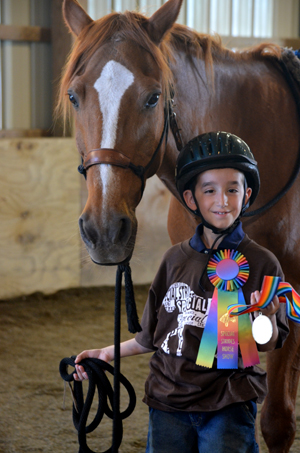Equine Assisted Activities and Services (EAAS)

Helpful Links & Resources
American Hippotherapy Association Inc.
Benefits of EAAS
Participation in EAAS provides the following benefits:
- Development or enrichment of motor skills, balance, posture, coordination, strength and body awareness.
- Motivation for speech and communication.
- Enhancement of skill acquisition, self confidence and self awareness.
- Improvement of overall physical, cognitive, social and emotional well being.
- Enjoyable activity that provides fun and enrichment.
Adaptive Riding, Driving and Vaulting
Adaptive Riding, Driving and Vaulting gives individuals with special needs the opportunity to engage in a recreational activity for competition or leisure. In addition to the recreational benefits, there are physical benefits to these activities such as influencing coordination, balance and strength. There are also numerous secondary and transferable benefits that include, but are not limited to; better understanding of non verbal communication skills and body language, learning to work as part of a team, improved self-esteem, confidence, concentration and patience. Engagement in these kinds of activities provides an overall sense of well being for the participant.
Use of Equine Movement in Therapy
Hippotherapy is a treatment strategy used by Physical Therapists, Occupational Therapists and Speech-Language Pathologists. It is part of an integrated treatment plan that utilizes the motion, emotion and sensory qualities of the horse in a powerful combination to achieve functional therapeutic goals. Utilizing the 3 dimensional qualities of the horses gait the therapist is able to facilitate changes in the neuromotor and sensorimotor systems that provide the foundations for movement and language.
Use of Equine Interaction in Learning and Psychological Treatment
The best practices and research in the field of Equine Facilitated/Assisted Learning and Equine Facilitated/Assisted Psychotherapy are being set by several national organizations. Currently, the two major contributors are PATH Intl., and EAGALA. Both of these organizations have extensive certification programs for professionals interested in working in these fields and it is to your benefit to research the backgrounds of any program or individual whose services you are interested in securing.
Using Equine Interaction to Facilitate Learning, Personal Development and Growth
Equine Facilitated/Assisted Learning (EFL/EAL) is based on an experiential education methodology that uses the interaction and developing relationships between horses and humans in an environment of learning and self discovery. EFL /EAL are educational in nature. It involves discussion around educational content and subsequent participant learning which is developed collaboratively between a team of professionals i.e. equine specialist in mental health and learning and; a certified teacher, experiential educator, equestrian instructors, recreational therapists, life coaches, spiritual advisors, corporate leadership trainers, occupational, physical and speech therapists, and mental health therapists for activities outside of a clients treatment plan. These programs are generally un-mounted.
Use of Equine Interaction in Psychotherapy
EFP/EAP is a form of experiential psychotherapy that includes equines in the session and is provided by a licensed mental health professional i.e., a; psychologist (PhD), masters in social work (MSW), licensed marriage and family therapist or counselor. The session is clinical in scope, as it provides the client an opportunity to enhance self-awareness and re-pattern maladaptive behaviors, feelings and attitudes. Unless the licensed mental health profession is dually trained, an equine specialist in mental health and learning is also in attendance and handles the horse. These sessions are un-mounted.
Participation
There are specific parameters for eligibility to participate in EAAS. These parameters are set by each program and should be discussed fully with you during your initial call. The safety and well being of all involved is the number one priority.
